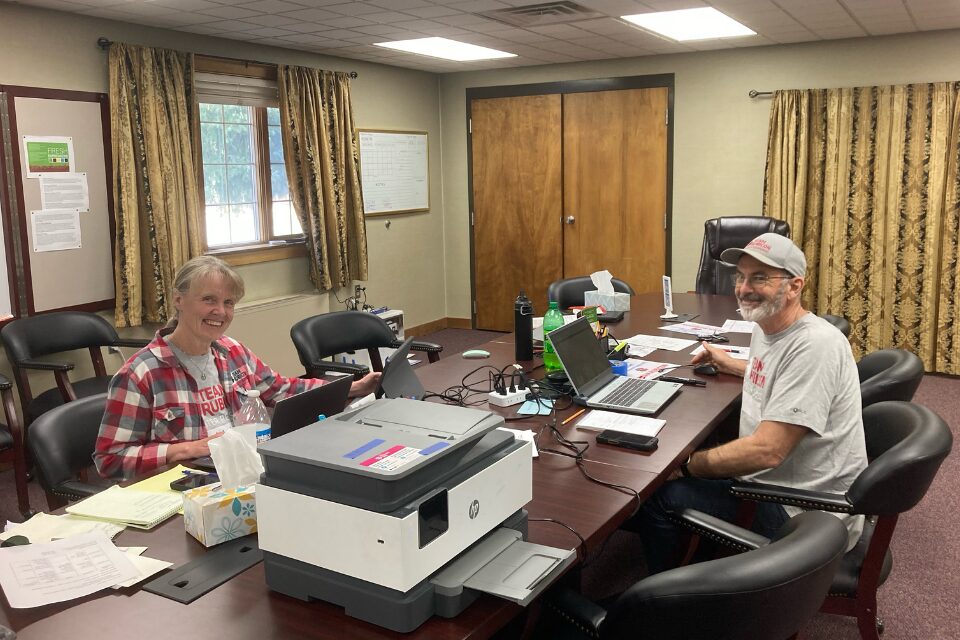Marshall and Grand Blanc UMCs reached out to their communities following recent tornadoes, providing examples of how churches can be prepared for and respond to disasters.
GLENN M. WAGNER
Michigan Conference Communications
Ready or not, disasters happen. What, where, why, and when are often unknown in advance. Disasters can be natural, caused by disruptive events like earthquakes, floods, and massive storms. Humans can also cause catastrophes through war, mass shootings, and financial calamities, such as a stock market collapse.
This is the story of two natural disasters affecting real people in the early hours of February 28, 2024, in two different Michigan communities over 100 miles apart. More importantly, the story reports the inspirational and connectional response of United Methodist leadership and congregations in both Marshall and Grand Blanc, Michigan. United Methodists cooperated with other volunteers, city and rescue personnel, relief agencies, and local businesses to respond to the immediate needs created by these local disasters. The response demonstrated teamwork, hospitality, generosity, and the expert help needed for affected neighbors.
One tornado, with wind speeds in excess of 100 miles per hour, touched down outside Marshall, cutting a swath 300 yards wide for five miles across the rural landscape. The storm uprooted trees, downed power lines, and caused significant damage to nine homes and multiple farm buildings.
Fortunately, there were no reported casualties in this natural disaster. Rev. Erin Fitzgerald, pastor of the Marshall United Methodist Church, remembers the sounds of the storm in the middle of the night. The rushing wind sounded like a speeding train rumbling by, shaking trees and buildings.
Pastor Fitzgerald received her first phone calls asking for help early in the morning on February 28. One of the nine families whose home was significantly damaged by the storm was from her congregation. Without power in their damaged home, they asked if they could come to the church for some temporary shelter and to charge their cell phones.
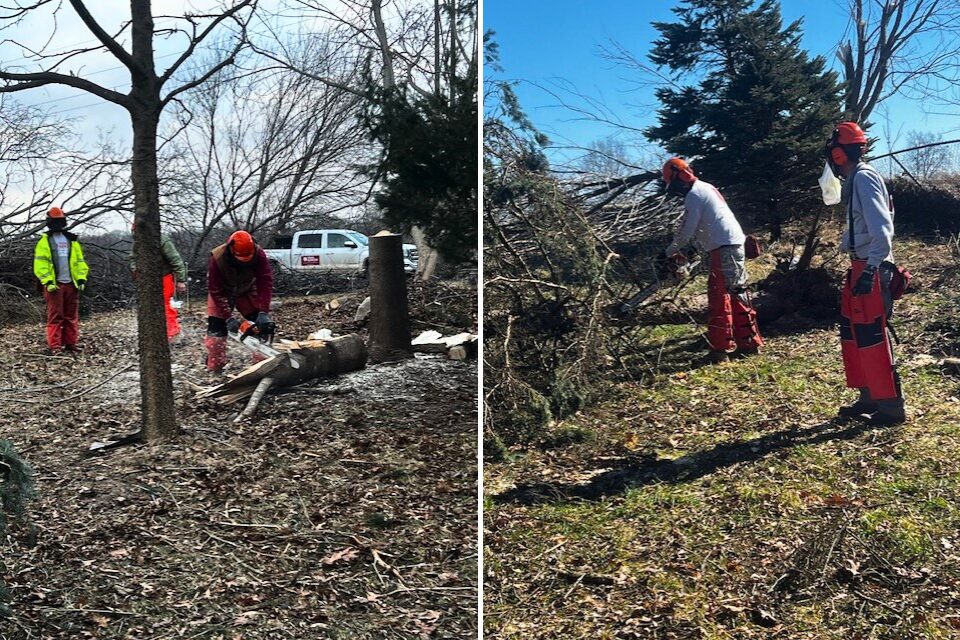
Shortly after, Fitzgerald received another phone call from Rev. Kayla Roosa, the Michigan Conference’s Interim Co-Disaster Response Coordinator, and Dan O’Malley, After the Storm board member. Roosa is also on After the Storm’s board. An affiliated nonprofit of the Michigan Conference, After the Storm has become a trusted ministry partner and expert in long-term disaster case management in Michigan.
Roosa and O’Malley called to ask if Marshall UMC would be willing to host a group of 15 volunteer veterans from Team Rubicon. This international humanitarian nonprofit trains and mobilizes U.S. military veterans who respond to disasters with volunteer expertise in disaster cleanup and recovery.
Fitzgerald had been pastor of St. Paul’s UMC in Grand Rapids earlier in her ministry when another tornado devastated homes near her church. She was introduced to and had a positive experience with Team Rubicon on that occasion.
She already knew the team would be run well by people of great expertise, integrity, and respect for others. Fitzgerald welcomed the invitation and expressed her appreciation for O’Malley and Roosa’s subsequent help coordinating details of the team’s arrival with local officials already on the scene.
According to Fitzgerald, Marshall UMC opened its spacious 60,000-square-foot facility, which became command central for the 15-member rescue team of veterans who arrived in Marshall from all over the Midwest. The veterans slept in the church, ate many of their meals there, and staffed a command post that helped to screen and deploy other community and area volunteers who stopped by with a desire to assist with recovery efforts.
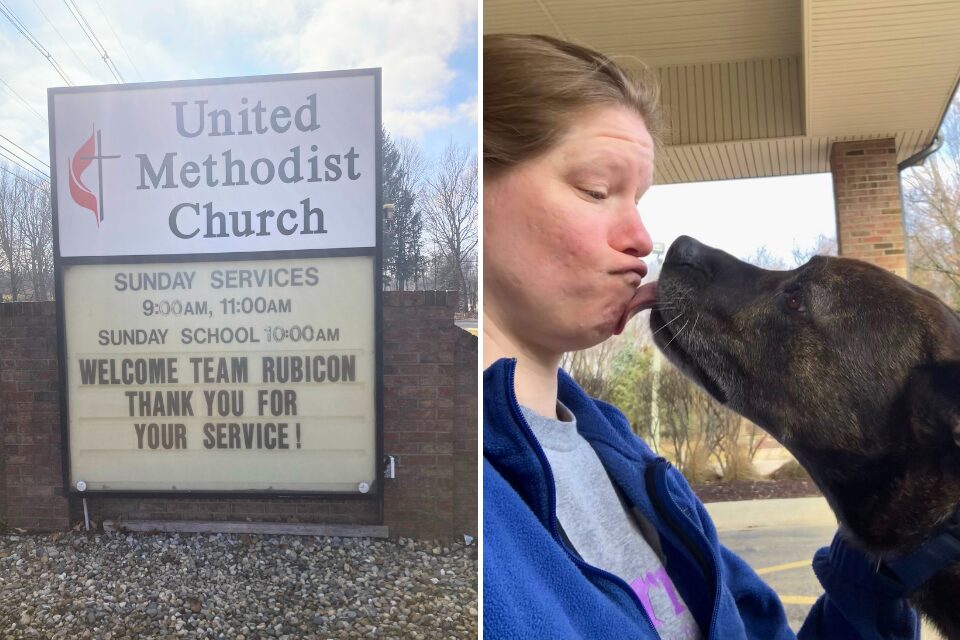
Fitzgerald praised the generous efforts of church volunteers who arrived at the church to prepare donated food and serve meals to the members of Team Rubicon during their four nights at the church.
Since Team Rubicon labored in recovery efforts from 7:00 am to 5:00 pm during their days in the community, Fitzgerald was grateful for Marshall-area restaurants that donated breakfasts daily to feed the volunteers. These included Pastrami Joe’s, Foundry Bakehouse and Deli, True North Ice Cream, Dairy Queen, and McDonald’s.
Oaklawn Life Improvement Center, a local fitness center with showers, allowed the volunteers to clean up at their facility each night after work. Several banks and insurance agencies brought water, Gatorade, and snacks for the volunteers.
Local police increased patrols of the church parking lot, which contained out-of-state cars and a large Team Rubicon trailer full of expensive recovery equipment, such as chainsaws, ladders, and construction tools.
During the four days of area cleanup after the storm, Fitzgerald counted 280 people from the church, community, and beyond who volunteered time and resources for the effort. She remembered one man who surprised everyone by showing up with 15 pizzas to feed the volunteers.
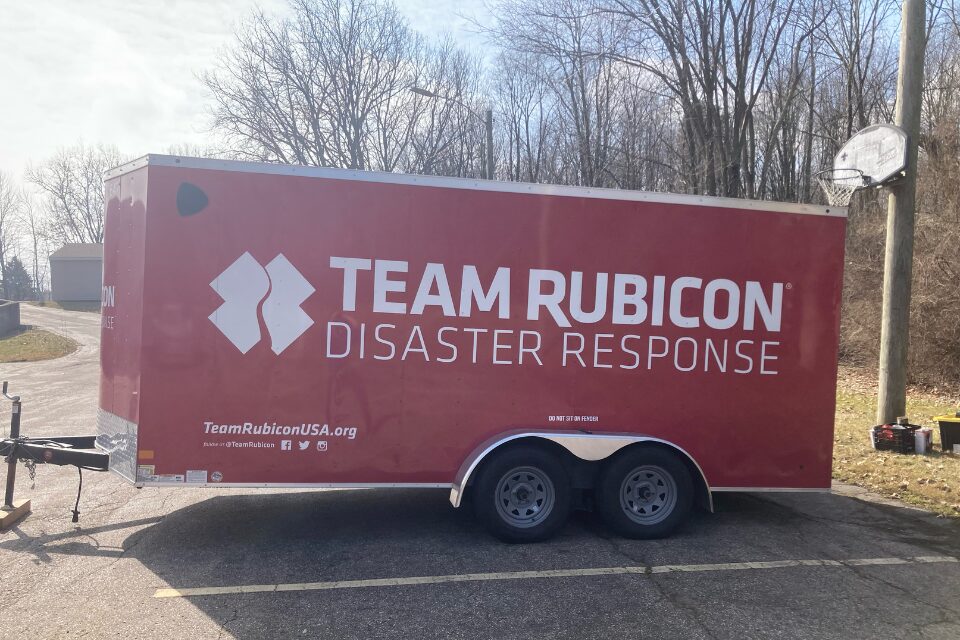
On the very same night, at about the same time, tornado sirens alerted the residents of Grand Blanc, Michigan, of an approaching EF-2 tornado with wind speeds over 110 miles per hour. The tornado touched down near Dort Highway outside of town. It ripped through Grand Blanc by destroying an industrial warehouse and then proceeding through the downtown and an adjoining subdivision, damaging about a dozen homes. It then passed behind the Grand Blanc United Methodist Church into a 137-acre nature preserve known as the Grand Blanc Commons.
The church experienced minor damage to part of its rubber roofing, had several uprooted trees, and had its parking lot and property littered with storm debris over a mile away. According to Grand Blanc UMC’s pastor, Rev. Brian West, there were no injuries or loss of life from the storm. Power was out for many people in Grand Blanc for a day and a half and three days in the area of initial impact near the destroyed warehouse. West commented that while busily shepherding his family to the parsonage basement for safety from the storm, he noticed several neighbors on their porches watching its approach. West knows now that the tornado’s path was just two blocks from their house.
The morning after the storm, West began receiving phone calls with expressions of concern and asking for an assessment of need. He received calls from East Winds District Superintendent Margie Crawford and Michigan Conference Bishop David Bard. He also heard from Rev. Kayla Roosa, the Michigan Conference’s Interim Co-Disaster Response Coordinator.
All of the callers wanted to know how they could be of help. At the advice of local leaders, relief efforts were organized by local officials, insurance companies, and contractors. The city of Grand Blanc took the lead in organizing the cleanup.
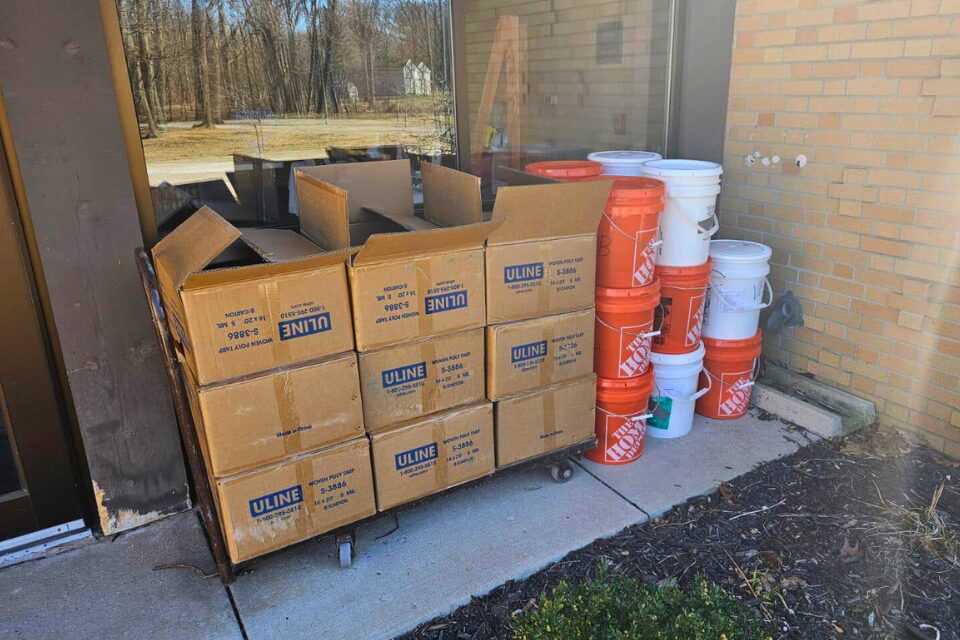
Grand Blanc UMC was contacted by Disaster Relief at Work (DRAW), a national nonprofit devoted to helping respond to disasters and headquartered in Pontiac, 36 miles away. The church gratefully became a distribution point in town for flood buckets filled with cleaning supplies and tarps that DRAW delivered to the church for residents to use to clean up after the storm.
West shared that he has listened to stories in the aftermath of the storm, as people need to talk about their experiences. He noted that many in the community experienced a new kind of trauma during the storm and a few days later when they were surprised by a routine once-a-month testing of the town’s emergency tornado sirens. During worship at Grand Blanc UMC on Sunday morning after the storm, West wisely changed the focus of his previously scheduled Lenten sermon series to acknowledge what the community had been through together.
The tornadoes that struck the Michigan communities of Marshall and Grand Blanc on February 28, 2024, are another reminder that disasters do happen and can happen anywhere and at any time. Affected communities have a fresh appreciation for the people and resources available to respond to these emergencies with expertise and a willing spirit.
The Michigan Conference is here to help churches learn how to respond to disasters promptly and appropriately. The conference recently updated the Conference Disaster Ministry Response Plan, which explains the different stages of a disaster and what role a church should play when one occurs in their communities. Response and recovery is a team effort.
The Michigan Conference asks each congregation to be prepared by downloading, printing, reading, and understanding this disaster plan. Please ensure the printed plan is stored safely, as you may be unable to print it off in the aftermath of a disaster.
Churches should review the plan carefully, especially pages 26-28, which outline specific tasks related to each stage of a disaster, including connecting with local authorities and resources. Rev. Kayla Roosa and Rev. Bob Miller are the Michigan Conference’s Interim Co-Disaster Response Coordinators and are ready to assist churches in planning and preparation. Their contact information is on the Michigan Conference’s Disaster Response web page.
The Michigan Conference, in collaboration with After the Storm, also offers volunteer and training opportunities for United Methodist individuals and churches at different stages of disaster response. View all the opportunities on the Michigan Conference’s Disaster Response web page.
On April 15-19, 2024, the Michigan Conference and After the Storm are co-sponsoring a volunteer week to assist flood survivors in Detroit and provide Early Response Team (ERT) basic training. Click to learn more about these volunteer service opportunities.
Spend a few hours helping neighbors in need in Detroit. Bring a small group from your church, or come by yourself. That same week, an optional training for persons interested in becoming an UMCOR-certified ERT volunteer will be held. Click to learn more about this training offered at Cass Community UMC in Detroit on April 15-17. The registration deadline is April 1.
Last Updated on April 1, 2024

